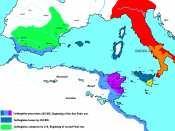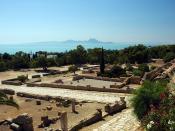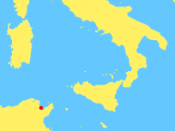"Were the Punic Wars a phyrric victory for the Roman Republic?"
The term "Punic Wars" refers to the series of wars fought between Rome and Carthage between 264 and 146 BCE. The Romans called the Carthaginians Poeni (Phoenicians), from which is derived the adjective "Punic." There were three Punic Wars: The first war marked the first Roman involvement outside of Italy, and represents the beginning of the Roman conquest of the Mediterranean. The second was the hardest war the Romans ever fought, resulting in huge losses for the Romans in materials and manpower. The third was an act of vengeance in which the Romans finally invaded and obliterated the Carthaginians.
Was the outcome of the Punic Wars a pyrrhic victory for the Roman Republic? Despite Rome's losses it can be argued that the overall outcome of the Punic wars was a legitimate Roman victory, as Rome became technologically advanced and more economically and culturally influential.
The wars were decisive in the emergence of imperial Rome and the beginning of the Roman influence on western history.
Firstly, Rome became more technologically advanced through necessity, and also learned how to properly wage a large-scale war.
Rome recognized the need for improvement in sea battle: made the 'corvus' to facilitate land warfare on the sea.
Rome learned how to conduct war on a massive scale: The Senate learned how to finance a large war, how to find men for armies, how to find supplies, how to build fleets, how to conduct politics in times of war.
Thus, Rome became more technologically advanced in naval battle and learned important lessons in warfare it would apply in later struggles on its way to becoming a powerful imperialist
Furthermore, Rome's victories in the Punic Wars established them as the greatest economic and cultural power in the...


